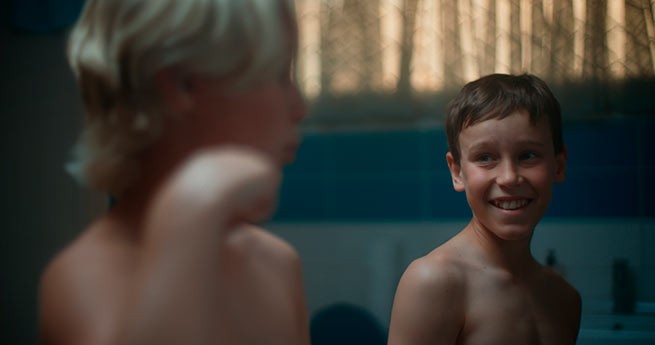“The reaction to the screening of ‘Boys in the Shower’ in elementary school is indicative of the lack of a coherent sex education strategy in Greece,” said Kathimerini columnist Elvira Kritaris.
“If a teacher were teaching a lesson about water, no one would ask him why you showed this video or that one. The question arises because we are talking about human relationships, about the body, about sexuality and gender.” Margarita Geruki, PhD, elementary school teacher and member of the World Sexual Health Association (WAS) Committee on Sex Education, points out “TO“on long-standing gaps in the debate about the content and focus of sex education in Greek schools.
The choice of a teacher to show the film “Boys in the Soul” by the Swedish director Christian Zetterberg in an elementary school, as part of the lesson, caused violent reaction from the student’s parentswho filed a lawsuit against the school, but also gave another reason to point out the lack of a coherent sex education strategy in Greece.
“If we don’t make it clear exactly what our position as an education system is on these issues, we’re going to have problems all the time.”
The film is available at the Hellenic Film Center on the CINEDU platform for educational use and is listed as a film for high school students – although it has also been shown to younger students. Boys in the Shower was erroneously labeled as “sexually explicit” by some media while it was considered quite suitable for children, winning among others the Best European Short Film for Children award from the European Children’s Film Association.
As the nine-minute film’s narrative revolves around concepts such as growing up boys and uncovering stereotypes of masculinity, M. Geruki believes that the reaction was due to the fear of projecting sexual diversity. “If we don’t make it clear what our position as an education system is on these issues, we’re going to have problems all the time,” she says.
Abstract framework, inadequate preparation
In a succinct statement, the Education Policy Institute, which is responsible for providing sex education materials, disclaims all responsibility, stating that it has not approved the films posted on the platform. The statement did not specify whether they need to be approved as the choice of film to screen appears to be at the discretion of the school, but it does make clear there is a gap in communication between the ministry, teachers and parents.
“When the framework is so abstract, it creates difficulties and possibly mistakes for teachers,” says Margarita Geruki. “The teachers don’t have the necessary training,” says psychotherapist and parent-teacher consultant Christina Rasidaki. “They don’t know what material to use and they are also very afraid of their parents,” she adds in an interview with K.
Awkward adults
In Chania, according to M. Geruka, a few years ago, teachers were embroiled in a legal battle after parents complained of sexual abuse in a sex education class “because they heard their genitals being called by name,” she says. The embarrassment of parents and teachers is completely understandable, because they themselves have not experienced sex education. They are afraid of harming their children, “making them perverts.”
Cristina Rassidaki recognizes in the main interlocutors of children, when it comes to these issues, justified confusion. “Most parents want someone to help them because they themselves are struggling. Many feel desperate about the sexual freedoms of our time because some of their beliefs have been shaken, and this causes fear.”
The key issue that these two experts highlight is the relationship between sex education and deeply rooted value systems. Margherita Geruki asks us to imagine two fanatical vegan parents raising a vegan child and a hypothetical teacher bringing a non-vegetarian cake to class. “I don’t think bigoted vegan parents would send a teacher an apology letter,” she says, pointing out that issues related to sex and gender have an ethical dimension. “We have not discussed seriously and adequately what sex education is and what it is for. We, as a society, must understand that sex education is health, not morality,” she states emphatically. “Children in Greece – and Greek society as a whole – in terms of sexual health are at a very low level. On contraception, on abortion, on violence, on lack of knowledge. Our children finish high school and do not have basic knowledge about their reproductive system.”
When is it okay to have sex and what are the best positions are the most common questions elementary school children ask their teachers
Sex education, although included in the Greek education system since 2003 as an elective, becomes mandatory in 2021, but without a curriculum, targeting and specific textbooks, the teacher notes. However, she adds, if the teacher is trained, he will also train the parent.
“There is not a single parent in Greece who, if you talk to him and explain what is being done and why, honestly and scientifically, will not agree. There is not a single parent who would like his child to suffer or would say:” No, that’s it. okay, I’d rather my child get sick or grow up sick.” Parents in Greece tell us that they really want to talk to their children, but they don’t know what to say or how to say it. And they find themselves in a whirlpool of uncertainty and anxiety. When the school does something systematically and effectively, it gives the parents at home the “go-ahead” to continue and contribute to sex education,” emphasizes Margarita Geruki.
When can I have sex, and what positions are best. These are the most common questions children ask their teachers even before they leave elementary school, the teacher says. “A lot of pornography. Our children are exposed to incredible pornography even before they enter high school. They don’t grow up in a fish tank. When a child has questions, he will seek and find the answer. Alas, if we don’t answer it! – she concludes, “Children are exposed to numerous sexual stimuli. Sexuality is a very big part of our lives. We can’t stick our heads in the sand,” emphasizes psychotherapist Christina Rasidaki.
Children who are empowered
Experience in the classroom shows that children not only want to learn about their bodies and their sexuality, but also learn information effectively. After a lesson in the anatomy of the genital organs as part of sex education, one little student found his teacher crying during recess and told her that he realized that he “suffered from vomiting,” says Margarita Geruki, referring to the testimonies of colleagues. “The parents did not understand. The teacher told the mother , and the problem she encountered was easily solved.”
In another case, it was observed that, having been trained in the concept of consent and the limits of what is permitted, young schoolgirls scolded a classmate for lifting up their skirts. “No, you have no right to do that,” they said to each other, fostering what we call in education “dynamic behavior – dynamic attitude,” says the teacher.
Parents and teachers understand that children educated in sex education talk about their bodies “without laughing or fooling around” and know that they can turn to a trusted person if something happens to them, “even call 1056 “They know that there is a phone number where they can talk,” says Margarita Geruki.
At the same time, what sex education additionally seeks is the representation of minorities, which are favorites for bullying. LGBTI children are overrepresented as victims of bullying, experts say. “10% of our children have or will have a non-heterosexual orientation or a non-gender perception of gender. These children grow up in a society dominated by a phobia syndrome in relation to these differences, never seeing anything in school that would correspond to their sense of self,” the teacher concludes.
The opinion of the author may not coincide with the opinion of the editors







More Stories
Flowers for Easter
Snowy Easter
How mother Olga saved cottage cheese Easter and Easter cakes